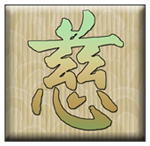On The Way: The Daily Zen Journal
Discourse of Master Han Shan – Part 2
Han Shan Ta Shih (1545-1623)
The first step you should take in Zen work is to forget about all understanding and knowledge and concentrate on one thought. Firmly believe that your self-mind is originally pure and clear, without the slightest trace of any existence – bright, perfect, and ubiquitous throughout the entire universe. From the beginning there was no body, mind, or world, nor any erroneous thoughts or infective passions.

Search out the point where your thoughts arise and disappear. See where a thought arises and vanishes.
Keep this point in mind and try to break right through it; try to crush it with all your might! If you can crush it to pieces, all will dissolve and vanish away. At this time, however, one must not follow it (the instantaneous experience) nor try to continue it.
Master Yung Chia once admonished, “The thought of continuation should be cut short.”
This is because floating, delusory thoughts are virtually rootless and unreal. Never treat the distracted thought as a concrete thing. When it arises, notice it right away but never try to suppress it. Let it go and watch it as one watches a leaf floating on the surface of a stream.
What you should do is to take up this awareness as if holding a sharp sword in your hand. No matter whether Buddha or devils come, just cut them off like a snarl of tangled silk threads. Use all your attention and strength patiently to push your mind to the very dead end of consciousness; just push it on and on.
Those who determine to practice the Dharma should believe firmly the teachings of Mind-only. Buddha said, “All the Three Kingdoms are mind, all ten thousand Dharmas are consciousness.”

All Buddhism is but an exposition of this sentence. Ignorance or enlightenment, virtue or wickedness, cause or effect, are nothing but one’s own mind. Not one iota of anything exists outside of Mind.
The Zen yogi should completely cast aside former knowledge and understanding. Here scholarship or cleverness is useless. Rather, look on the whole world as hallucinatory. What you see are mirages, mirror-images, like the moon reflected in the water. The sounds heard are hymns of the wind blowing through the trees.

See all manifestations as clouds floating in the sky—changing and unreal. Not only the outer world but all habitual thoughts, passions, distractions, and desires within one’s own mind are, likewise, insubstantial, non-concrete, rootless, and floating.
Whenever any thought arises, try to find its source; never let it go easily or be cheated by it. If you can practice like this, you will be doing some solid work.

Excerpted from The Practice of Zen by Chang Chen-Chi 1960 edition





The “first step” – has a nice ring to it. Such simplicity and clarity breaks through our tendency to complicate practice, something we all have done and still do at times.
However, as we delve further into this teaching the simple instruction to…
Search out the point where your thoughts arise and disappear. See where a thought arises and vanishes.
turns out to be more of a life-long effortless effort. And that brings up another conundrum of practice which to a beginner seems like nonsense. To begin takes some kind of effort, and yet we are told that trying to search too pointedly pushes us away from the very thing we seek.
So the other “first step” is how to make a kind of effort that is sincere and yet has no grasping. As soon as we try to hold on to any insight, at that moment it all falls apart. For some this can feel disturbing and discouraging…what to do?
However, there is a method called meditation that does allow for enough of a slowing down of thoughts to concentrate one’s attention into just that search. And at some point, it’s just what we do.
It helps also to remember:
It is imperative for those who practice the Way to believe in it. Those who have faith in the Way should know for certain that they are unfailingly in the Way from the very beginning – thus free from confusions, delusions, being upside down, increase and decrease, and errors. Believing in this manner and penetrating the Way thus, practice it accordingly. Such is the fundamental of learning the Way.
Dogen (1200-1253)
Here, Dogen can help us with this stumbling block. Keep on with practice realizing we are “unfailingly in the Way from the very beginning.”
It also can help to remember various phrases from our own training. The one that comes up for me now is:
Great effort,
No goal.
Celebrating a life of practice together,
Elana, Scribe for Daily Zen